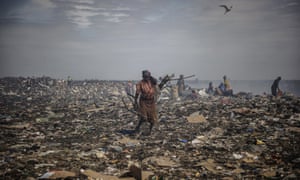What are the consequences of the "growth at all costs" fallacy, which prioritizes GDP growth without considering the ecological limits and social consequences?
The "growth at all costs" fallacy is the belief that prioritizing GDP (Gross Domestic Product) growth should be the primary goal of an economy, regardless of the ecological limits and social consequences. This approach fails to consider the long-term sustainability of economic activities and can lead to several negative consequences. Let's explore these consequences with simple examples:
Environmental degradation: The "growth at all costs" mindset often leads to the exploitation of natural resources without considering their finite nature and the capacity of the environment to absorb waste. For example, imagine a country that prioritizes rapid industrialization without implementing proper environmental regulations. This may result in deforestation, water pollution, air pollution, and the depletion of natural resources. Over time, such activities can damage ecosystems, harm biodiversity, and contribute to climate change, compromising the well-being of both present and future generations.
Social inequality: The focus on GDP growth alone can exacerbate social inequality. Economic growth does not always benefit all members of society equally. For instance, imagine an economy that experiences significant GDP growth driven by industries that rely heavily on low-wage labor. While the overall GDP might increase, the benefits may disproportionately flow to the wealthy or corporate elites, while the working class experiences stagnant wages and reduced social protections. This can widen the gap between the rich and the poor, leading to social unrest and an erosion of social cohesion.
Overconsumption and materialism: The "growth at all costs" fallacy encourages a culture of overconsumption and materialism, where people are constantly encouraged to acquire more goods and services. This can contribute to resource depletion and waste generation, placing further strain on the environment. For example, a society that values GDP growth above all may prioritize the production and consumption of goods without considering their environmental impact or the true well-being of individuals.
Neglect of social well-being: Prioritizing GDP growth without considering social consequences can result in the neglect of essential social factors that contribute to overall well-being. For instance, a society focused solely on economic growth may overlook investments in education, healthcare, social safety nets, and other critical social infrastructure. This neglect can have detrimental effects on human development, quality of life, and social cohesion.
Unsustainable economic practices: The "growth at all costs" fallacy can perpetuate an economic system that relies on continuous expansion and consumption, often at the expense of long-term sustainability. By disregarding ecological limits, such as resource scarcity and pollution thresholds, this approach can lead to economic instability, environmental crises, and compromised future prospects for economic development.
In summary, the "growth at all costs" fallacy, which prioritizes GDP growth without considering ecological limits and social consequences, can result in environmental degradation, social inequality, overconsumption, neglect of social well-being, and unsustainable economic practices. Recognizing the importance of sustainable development and taking into account ecological and social considerations is crucial for ensuring a more balanced and resilient economy that benefits both current and future generations.


